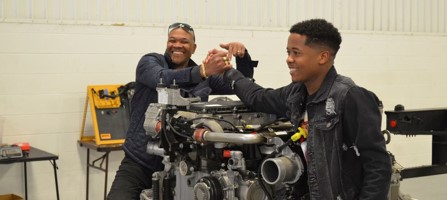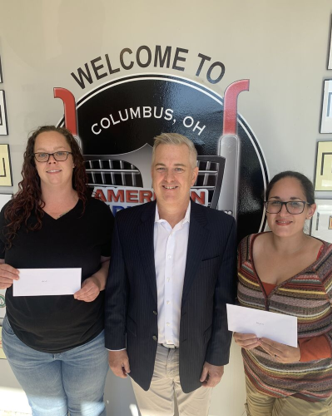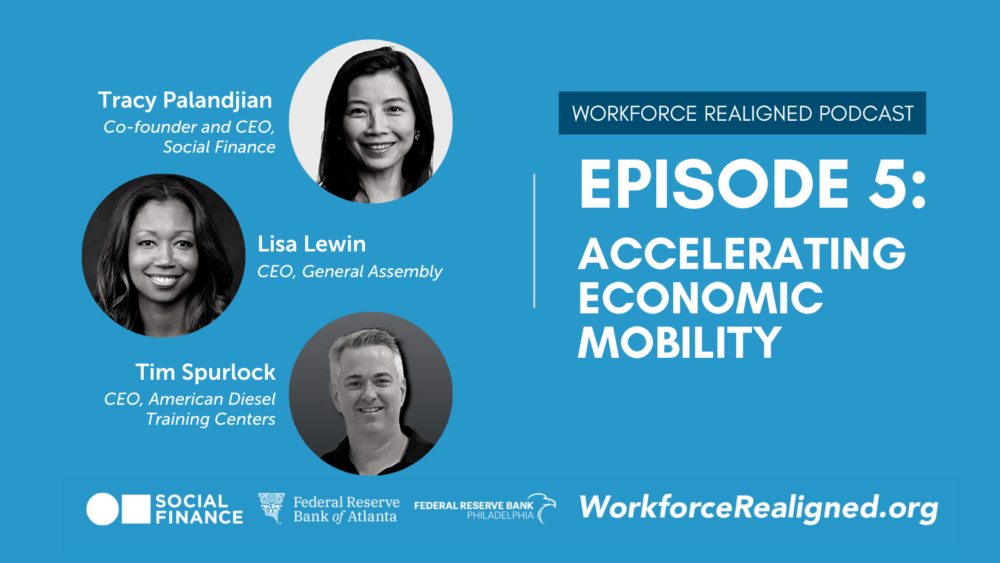

, Workforce & Economic Mobility
Key Takeaway
In this particular Career Impact Bond, some employers (Penn Power included) will even pay off a graduate’s training costs once they’re hired. The result is that everyone—investors, training providers, students, and employers—benefits when a worker finds a good job.
Earlier this month, workforce development, education, and government leaders gathered virtually to discuss workforce challenges and solutions at the 2021 ACT Workforce Virtual Summit. Social Finance Vice President Jake Edwards teamed up with Aaron Picozzi, President of American Diesel Training Centers (ADTC), and Bill Jones, Vice President of Fleet Services at Penn Power Group, to discuss the Career Impact Bond, a financing model for career-based training and wraparound supports to advance economic mobility.
Below, explore five takeaways from the event.
1. American workers and employers want the same thing: a world where workers are quickly and effectively trained for career-track jobs in high-need industries.
Bill Jones knows good workers are valuable. Indeed, each unfilled diesel technician role costs his company around $1,500 a day.
That’s why he puts a premium on making Penn Power’s employees feel comfortable, appreciated, and respected. He wants them to stay for the long haul. And workers want the same thing, said Picozzi. Students who enroll in ADTC, Picozzi’s diesel mechanic training program, are committed to gaining skills that will catapult them into stable, quality careers, like the ones Jones offers at Penn Power.
2. In the current workforce development system, nobody wins.
The challenge is designing a system that meets our workforce’s needs. As Edwards explained, pathways to high-quality jobs exist in our current system—but they are expensive, often prohibitively so, and they require students to leave their current jobs to train, plunging those without safety nets into financial uncertainty. The result, said Edwards, is that people who can’t afford tuition or to take time off are effectively locked out of new career paths.
3. Cross-sector partnerships, like Social Finance’s Career Impact Bond with ADTC, can realign risks and incentives so that everyone wins.
Partnerships that unite training providers, workers, and employers, like Social Finance’s Career Impact Bond with ADTC, offer a solution to the current system’s problems.
Edwards explained how the Career Impact Bond works: “We use impact investor capital to allow students to enroll in the training and access wraparound services, like a toolset, career coaching, and emergency aid funds. Students enroll and get 300 hours of training and wraparound support to maximize their success. If students are successfully placed in industry jobs, they repay the training costs. If not, they don’t pay anything.”
By centering student outcomes, this partnership ensures the financial stability of training providers while also granting employers access to a steady, qualified worker pipeline.
In this particular Career Impact Bond, some employers (Penn Power included) will even pay off a graduate’s training costs once they’re hired. The result is that everyone—investors, training providers, students, and employers—benefits when a worker finds a good job.
“We’ve created a program where an individual can build a career without ending up in debt,” said Picozzi. “We believe that this is going to be the future of training.”

4. Right now—post-Great Resignation, mid-worker shortage—is the right time to form these partnerships.
In the economic shakeup that followed the pandemic, said Picozzi, many workers began looking for higher-paying careers they could commit to—rather than transient jobs. At the same time, certain industries, like trucking, experienced massive shortages as older technicians retired, along with unprecedented growth as demand for transporting goods increased. Busier than ever, Penn Power expanded its fleet services operations. In that urgent moment, the Career Impact Bond allowed them to supplement their workforce “a lot more quickly than we conventionally would have been able to on our own,” said Jones.
As America continues to grapple with the repercussions of Covid-19, many employers and industries are struggling to fill job openings. Cross-sector partnerships like the Career Impact Bond offer a timely, effective solution to these challenges.
5. These programs can help organizations fulfill their DEI goals, too.

The ADTC Career Impact Bond is designed to serve students who face barriers to education and employment—like poor credit history, criminal justice involvement, or immigration status—barriers that disproportionately affect people of color. By increasing access to training opportunities, the Career Impact Bond can help place more individuals in industries that have traditionally lacked diversity.
To date, 25% of ADTC’s diesel mechanic graduates are Black, compared to the industry average of 7%; 7% of graduates are women, compared to the industry average of 2%; and 97% of ADTC’s students have no college degree.
We believe cross-sector partnerships like the Career Impact Bond are one way for organizations to build a more diverse workforce while meeting their hiring needs.
Related Insight

Harvard Business School’s Managing the Future of Work Podcast: Trainers Make the Grade When Students Get Good Jobs
Co-founder and CEO Tracy Palandjian explains career impact bonds and social impact bonds.

Workforce Realigned Podcast, Episode 5: Accelerating Economic Mobility
In this podcast episode, Social Finance CEO Tracy Palandjian, General Assembly CEO Lisa Lewin, and American Diesel Training Centers CEO Tim Spurlock discuss closing the skills gap and rethinking the way we finance worker training…

Investing in Skill Building: The Career Impact Bond
An FJC donor is putting philanthropic dollars to work by investing in economic mobility for low-income workers. The initiative is called the UP Fund, a $50 million pool of catalytic capital raised by Social Finance.